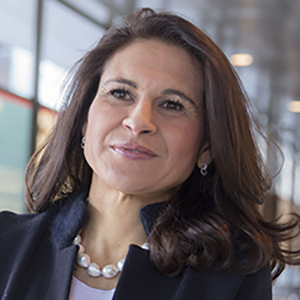Francesca DominiciNobel Conference 57

Does this drug work?
Traditionally, the answer to the question “is this medical treatment effective” has been answered using a large clinical trial that attempts to control for all variables. As treatments become more complex and customized to patients (think “new biologically derived cancer drugs”), clinical trials become unfeasible: impossible to design and too expensive to carry out. The advent of big data presents an alternative: collect existing data on patients with a variety of conditions and treatments, and use those data to compare outcomes. This alternative presents its own difficulties: how to draw meaningful conclusions from notoriously messy and incomplete data.
Francesca Dominici has developed new statistical methods for analyzing large amounts of medical data, and drawing meaningful conclusions about treatment efficacy directly from available data. These methods have been applied specifically to cancer research, in collaboration with the Dana Farber Cancer Institute and the Harvard Medical School. Dominici has also conducted research on the impact of climate change and air pollution on public health. The results of these studies have informed air quality policy in the United States, leading to stricter air quality standards.
Dominici is director of the Harvard Data Science Initiative, Harvard University, and the Clarence James Gamble Professor of Biostatistics, Population and Data Science at the Harvard T.H. Chan School of Public Health, where she leads interdisciplinary groups of scientists to address important questions in environmental health science, climate change, and health policy. She is an elected member of the National Academy of Medicine and of the International Society of Mathematical Statistics, and was in the Thompson Reuters 2019 list of the most highly cited researchers. She has been honored by organizations ranging from the American Public Health Association to the Committee of Presidents of Statistica Societies, to the University of Alabama.An advocate for the career advancement of women faculty, her work on the Committee on the Status of Women while on the faculty of Johns Hopkins University earned her the campus Diversity Recognition Award. She has a PhD in statistics from the University of Padua.